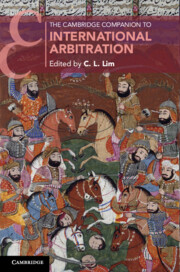Book contents
- The Cambridge Companion to International Arbitration
- Cambridge Companions to Law
- The Cambridge Companion to International Arbitration
- Copyright page
- Dedication
- Contents
- Contributors
- Foreword
- Preface
- Treaties, National Legislation, Cases and Awards
- Part I The History, Doctrines and Sociology of the Growth of Transnational Justice
- Part II International Commercial Arbitration as a Transnational Justice System
- Part III Investor-State Arbitration
- 8 Rise of a Discipline
- 9 Consent to Arbitration in Foreign Investment Arbitration
- 10 Applicable Law in International Investment Arbitration
- 11 The Historical Contribution of the World Bank
- 12 ICSID Today
- 13 The Future for International Investment Arbitration
- Part IV Inter-State Arbitration and the Pursuit of Peace
- Part V Systemic, Trans-Substantive and New Issues
- Index
13 - The Future for International Investment Arbitration
from Part III - Investor-State Arbitration
Published online by Cambridge University Press: 08 October 2021
- The Cambridge Companion to International Arbitration
- Cambridge Companions to Law
- The Cambridge Companion to International Arbitration
- Copyright page
- Dedication
- Contents
- Contributors
- Foreword
- Preface
- Treaties, National Legislation, Cases and Awards
- Part I The History, Doctrines and Sociology of the Growth of Transnational Justice
- Part II International Commercial Arbitration as a Transnational Justice System
- Part III Investor-State Arbitration
- 8 Rise of a Discipline
- 9 Consent to Arbitration in Foreign Investment Arbitration
- 10 Applicable Law in International Investment Arbitration
- 11 The Historical Contribution of the World Bank
- 12 ICSID Today
- 13 The Future for International Investment Arbitration
- Part IV Inter-State Arbitration and the Pursuit of Peace
- Part V Systemic, Trans-Substantive and New Issues
- Index
Summary
The architecture of the world order that was constructed from the ruins of the World War II has preserved a precarious peace, while allowing historically unprecedented economic growth. In his Nobel Peace Prize speech, Barack Obama warned that “[a] decade into a new century, this old architecture is buckling under the weight of new threats.” It is dispiriting to reflect on how prescient Obama’s words, delivered in 2009, were. Even allowing for the fact that at any moment there will be contrary trends toward and away from goals, key pillars of that world order do seem wobbly and in danger of buckling. Consider just two foundational arrangements. First, the prohibition of conquest and acquisition of territory by force continues to be flouted in an increasing number of cases – Crimea, Nagorno Karabakh, Abkhazia, South Ossetia, Abyei, the West Bank, East Jerusalem, the Golan Heights, Western Sahara, South China Sea, Tibet, the list goes on. Second, judgments of the International Court of Justice are effectively ignored, not by States ordinarily thought to be international renegades but also by sister judiciaries with long-standing claims to championing the rule of law: the US Supreme Court and the Italian Constitutional Court.
- Type
- Chapter
- Information
- The Cambridge Companion to International Arbitration , pp. 292 - 306Publisher: Cambridge University PressPrint publication year: 2021

